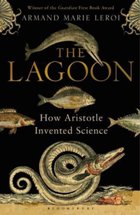The Lagoon: How Aristotle Invented Science
 Armand Marie Leroi
Armand Marie Leroi
Bloomsbury Circus, £25.00
Aristotle, one of the most influential philosophers of all time, arrived on the quiet Aegean island of Lesbos in the 4th century BC. Aristotle was also a biologist and the diverse life – from cuttlefish and black sea urchins to migrating birds and coralline algae – in and around the calm lagoon at Pyrrha caught his attention. This was part of the world that no one had ever looked at before, and he wrote about it all, describing it systematically and in great detail, and set about to explain it.
Having been captivated by Professor Armand Leroi's 2011 television documentary Aristotle's Lagoon, I jumped at the chance to review his book, and caught up with him at a lecture before its launch. As Leroi is an evolutionary biologist, I wondered if he considered Aristotle's ideas to be 'evolutionary' – after all, Aristotle believed that every species has its own role, its own soul and is particularly adapted to its environment.
Leroi admits that although it's tempting to find evidence of evolutionary thinking wherever he looks, this really isn't right: Aristotle did not think about what came before or how species may change. Life in the lagoon inspired Aristotle to see a harmonious and eternal world that had always been like this and would carry on in the same way.
The Lagoon, written with disarming enthusiasm, entwines the author's reflections and experiences with details of how Aristotle sought to understand, analyse and document the natural world of animals and plants.
Leroi mirrors Aristotle's passion for Lesbos and its lagoon, and has spent a great deal of time on the island in his search for all that Aristotle described. He even mourns the loss of Aristotle's eight books of diagrams The Anatomies. "If I thought that a copy of The Anatomies lay buried in Egypt's sands, I should dig until I found it, until I could see what he saw, how he saw it," writes Leroi.
Aristotle described life around the lagoon in such meticulous detail that it's pretty certain that he observed and dissected animals himself. Other animals, such as elephants, which he may never have seen, he wrote of as best he could from information gained from other sources.
Whereas Aristotle's works are famously devoid of personal details and emotions, Leroi's words are filled with passion and respect for Aristotle and life on the beautiful island. Although Aristotle has had his critics and did make many glaring omissions and mistakes, Leroi champions his systematic work.
He concludes by writing that we can now see Aristotle's intention and accomplishments more clearly than any previous age has seen them, and that this is because we have "caught up with him". Loaded with Leroi's own very dry humour and acute observations, The Lagoon is a hugely enjoyable read and is not to be missed.


